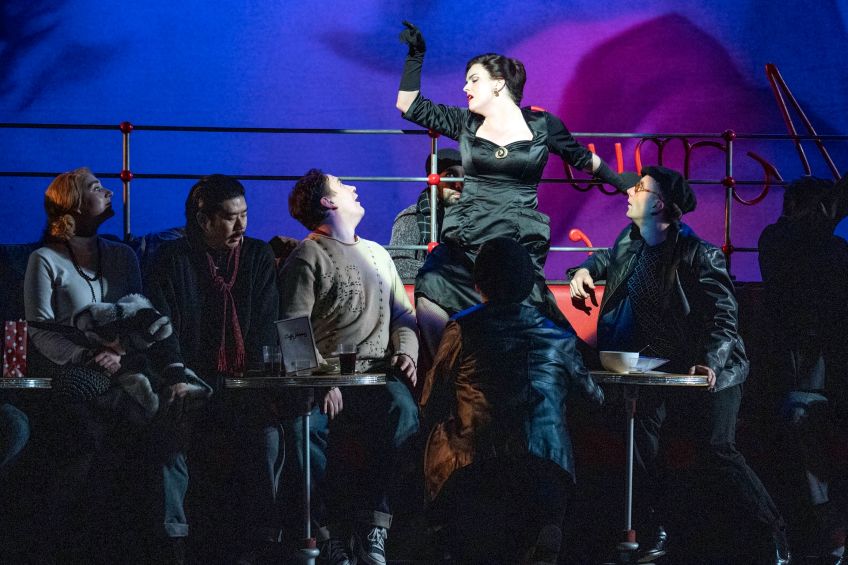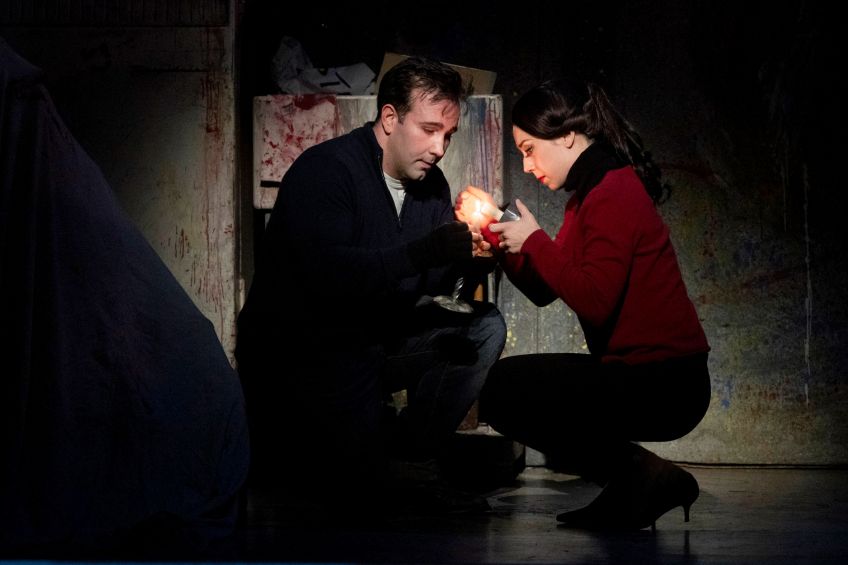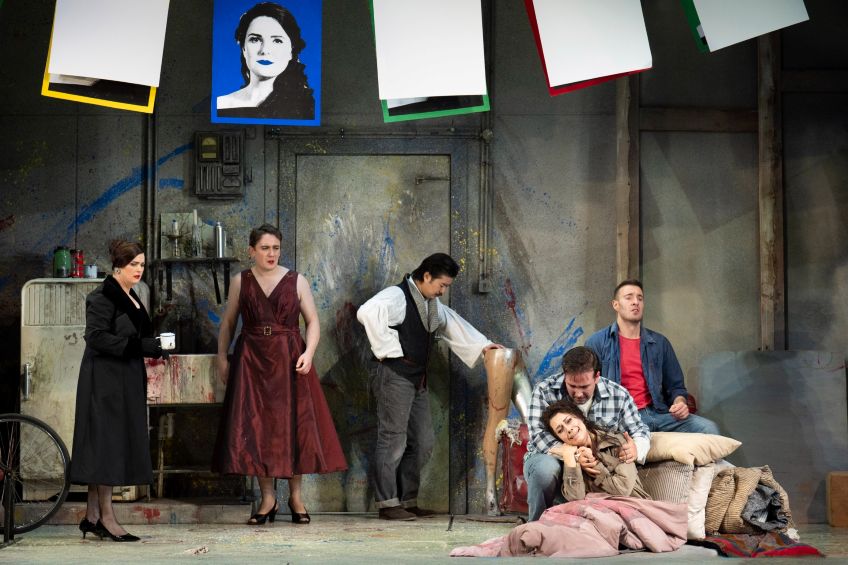One of the things Phyllida Lloyd CBE did prior to going famously all Abba-dabba-doo-Waterloo with her 1999 onstage Mamma Mia! and 2008 big screen version was to direct Opera North’s La Boheme in 1993, a production so popular it just keeps coming back. Now, in 2025, here we go again, this time with James Hurley directing.
With sublime music, vibrant characters and a touching, tragic love story that people of all eras immediately relate to, Puccini’s opera is one of the most popular the world over. It premiered in 1896, its simple, timeless story set in the 1830s. This time, though, we whisk off to the gay Paris of the1950s/60s (more or less) where impoverished students, musicians, poets and artists are still struggling to survive in freezing garrets in the bohemian Left Bank Quartier Latin. Twentieth-century moments add great fun to this production’s particularly well done comedy as Marcello chucks red paint about a la Jackson Pollock or strings up long series of Warhol-style colour-print portraits of the flitty, flighty, feisty Musetta, his on-off beloved. Further amusement comes when a Marilyn Monroe Seven-Year-Itch skirt plays a billowing role when musician Schaunard returns to the grim garret in blond-wigged drag.

Reflecting the movie/photo/art theme, a white frame edges the stage, though this goes unnoticed once attention is fully focused inside it. The onstage garret, where the first and final scenes are set, perfectly evokes the stark, freezing, impoverished lifestyle of the penniless artist, poet, musician and philosopher, kept warm and alive in true romantic, bohemian vein, only through their love and devotion to the arts. The tall, grimy, grey walls are daubed with paint while filthy, tattered chairs, sink and cupboards litter the place, along with a severed mannequin and other grot. There’s no money for the electricity meter and no fuel for the monstrously huge stove other than the paltry pages of Rodolfo’s manuscript, which bring but a fleeting cosy glow. An impossibly shiny, pristine motor-cycle sits there, too, which would surely fetch a small French fortune at the pawnbroker’s, and by the end it has, indeed, been down-graded to a push-bike; yet still the men have scarcely two centimes to rub together.
Within this stark, grubby space, the warm friendship, comic banter, cheery horseplay and dancing of the four men works a treat, their voices blending splendidly, too, in song. Sean Boylan plays the musician nicely warm and upbeat while bass man Han Kim is the philosopher Colline who sings his main solo to his coat before it goes off to the pawn shop. Well, why not? After all, Rodolfo sings to Mimi’s beret. As Rodolfo, Anthony Ciaramitaro’s fine tenor blends very pleasingly, too, in duet with Yuriy Yurchuk’s baritone as Marcello, his close friend and adviser and with Olivia Boen’s soprano Mimi as they duet beneath the moon. Jeremy Peaker provides more fun as scruffy, ragged landlord Benoit, also convincing in the more elevated role of wealthy Alcindoro, Musetta’s man of the moment.

The set of the Cafe Momus is handsome and practical with red seats joined together in a long row that rotates 180 degrees to take us outside. It feels stark and regimented at first, but the space is used wonderfully, and at various levels, for the cavorting, diva-style interactions of vibrant, flamboyant, fickle flirt, Musetta (soprano Elin Pritchard) in black dress and leopard-print coat. Demonstrative, independent, in command, Pritchard creates a bold, brassy, brazen exterior that houses a caring heart of gold. Through soap-opera ups and downs, break-ups, make-ups and on-off relationships she goes, with besotted Marcello – a fine, sturdy baritone in leather jacket and jeans – unable to tear himself away from her charms. Like Pritchard Yurchuk sings with full engagement and maintains a fine-voiced presence.
With huge choruses of older and younger singers the Christmas and carnival scenes are very handsome and busy. Beautiful and well-sung though they be they don’t realistically evoke Paris but they do serve to provide stark contrast to the artists’ impoverished Bohemian lifestyle as swathes of upmarket-neat, well-dressed, improbably coordinated people, many in elegant reds and tartans, fill the stage, all slickly choreographed and hugely organised: children dance and leap with giant toys and rolling hoops, Christmas trees parade, roller skates skate, and gendarmes appear along with sailors in cherry-bakewell hats who are not at all rough and ready. Having fun is a fast, frantic busy business! And all the while, the big Orchestra of Opera North, under the baton of Garry Walker, brings out the full beauty and contrasts in Puccini’s score, travelling from carefree, breezy and light-hearted, jolly, boisterous and hectic to lyrical, sad and sorrowful.
The love-at-first-sight scenario between Mimi and Rodolfo (or, since it takes place in the dark, love at first sigh) is hard to fully buy into and there’s no obvious chemistry between the pair, but in both her solos and his, and in their duets, there are highlight moments when voices soar with Puccini’s melody to delicious heights. In delicate song, broad-toned soprano Olivia Boen’s terminally ill Mimi tells us several times that everyone calls her Mimi even though her name is actually Lucia – but she doesn’t know why. Tragically, we never find out why, either. That a seamstress of that era is wearing trousers is a bit of an enigma, too. But that’s just by the by, for the ultimate, devastating tragedy of the piece is a supreme tear-jerker, the drama and heartbreak brilliantly evoked through Puccini’s magical mastery of music.
This handsome, busy, vibrant production of a simple, tragic love story makes the most of elements of fun and comedy as we travel towards its inevitably sorrowful conclusion, all serving to keep La Boheme’s everlasting appeal fresh and alive.
Eileen Caiger Gray




